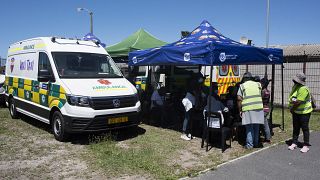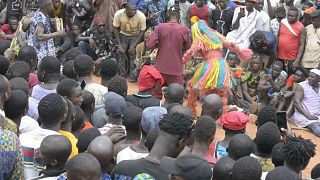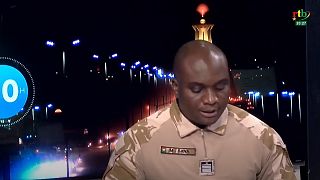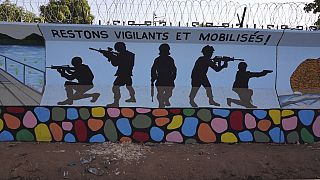Burkina Faso
Mariama Sawadogo sits in a small radio studio, translating notes from French to the local language of Moore and scribbling talking points in the margins.
Transmission, prevention, vaccination - Sawadogo hits these topics in her bimonthly show on Zama FM, interviewing doctors and nurses about COVID-19 and testing callers on their knowledge.
Many guests and listeners in Burkina Faso call the 44-year-old "Aunty" as she gently guides them to the answers and awards prizes such as soap and washing buckets.
Sawadogo's voice has become a familiar sound for nearly a million people in her town of Kaya and beyond in the West African country, where many feel the government has let them down.
Hungry for information about the virus, mothers huddle together and share rare mobile phones to tune into Sawadogo's show while their children play nearby.
Tests, vaccines and public messaging often miss many of the country's 20 million residents, despite a $200 million budget for virus response efforts.
In a region where women are responsible for family work and community relationships, they've stepped up to provide a collective authoritative voice, make and deliver supplies, and find ways to support their families through the economic crisis.
"In addition to what they (government) told us, we have learnt more by listening to the radio," said Zenabou Sawadogo, who is not related to Mariama Sawadogo, but is a loyal listener.
Kaya is a haven in the conflict-plagued country, where tens of thousands of displaced people have sought shelter as violence that spilled over from neighboring Mali in 2015 escalates.
Amid a chaotic atmosphere - with the military struggling to stem violence and an ultimatum from the opposition to the president - misinformation has flourished.
Sawadogo's radio presence is a leading voice to fight it.
She hears from listeners who say the pandemic was created to mislead Black people and that vaccines will sterilize them.
But the mother of three boys is accustomed to naysayers and skeptics.
In 2007, she left her first husband despite a cultural aversion to divorce.
She went to night school and became an accountant.
Her internship was at Zama FM.
Her bosses sensed a strong radio presence after she recorded some ads.
In 2016, she started hosting shows.
When the station got EU funding for the virus program, she was a natural choice.
"You're on Zama FM, how are you doing?" Sawadogo greets callers.
But her work does not stop in the studio, she frequently gathers with the women of her neighborhood to keep talking and answering questions about COVID-19 and other topics.
Burkina Faso was hard hit when the pandemic struck last March, recording some of Africa's highest infection numbers and death rates.
Officials implemented curfews, sealed the landlocked country's borders, and closed mosques, churches, schools and markets.
Residents protested; after a few weeks, most restrictions were lifted.
"There were some efforts, but I know it's not sufficient, we can do better," said Dr. Brice Bicaba, the government epidemiologist leading Burkina Faso's coronavirus response.
Part of the government's budget went toward flyers, radio and TV messaging, and other community engagement measures, according to Bicaba and budget documents.
But many health professionals and citizens said efforts are not reaching all the people they need to; in Kaya, locals said they would have preferred door-to-door visits over one public meeting in December.
And messages were not always translated into local languages - most people don't regularly speak the official language, French.
Even in the capital Ouagadougou, some 60 miles (85 kilometers) from Kaya, messaging has not been widespread, with COVID-19 billboards and signs scarce.
There, Zenabou Coulibaly Zongo spends her own money making soap and buying hand sanitizer for mosques, markets and health centers.
At the start of the pandemic, Zongo, now 63, needed hospital treatment for bronchial pneumonia.
She paid for oxygen treatments at a private clinic, watching others die.
"I saw many people who came having respiratory difficulties. Some of them didn't even have the opportunity to have care and died on the ground, like that, in front of me," said Zongo, a founding member of the Council of Burkinabe Women.
Now, she delivers her soaps and informs people about COVID-19.
Many inside and outside Burkina Faso do not trust virus data provided by the government, which has reported 15,514 cases and 265 deaths in total, noting a lack of testing and a health system the UN has called among the world's weakest.
Burkina Faso has also struggled to rollout COVID-19 vaccines.
Despite being part of COVAX, the UN-backed program to provide shots to developing nations, the country was one of the world's last to receive the jabs.
By October's end, about 284,000 people - less than 1.5% of the population - were fully vaccinated, according to World Health Organization figures.
Vaccine hesitancy runs so deep that even radio host Sawadogo has yet to receive a jab.
She worries about links between the vaccines and rare blood clots in women, widely publicized during a fumbled rollout of the AstraZeneca vaccine in Europe.
Zongo is also not vaccinated, insisting she first wants to finish medication for a recent accident.
Both women are part of a gender gap that experts fear means African women are the world's least vaccinated population.
But Zongo and Sawadogo say they will eventually be vaccinated and continue spreading messages about COVID-19 and advocate for women.
"It is true that we have many problems, we are victims of many actions, but women need to know that they are like a phoenix," Zongo said. "Whatever difficulties we may have, whatever the cost, they (women) must know in their hearts that they have the ability, to rise from the ashes."











Go to video
Equatorial Guinea secures investment-grade rating — But for how long {Business Africa}
Go to video
Sahel alliance recalls ambassadors from Algeria over Malian drone downing
00:52
Burkina Faso denounces fake massacre videos
02:09
Electric tricycles empower women in rural Zimbabwe
02:20
Human Rights Festival highlights global efforts and Fulani struggles
00:55
Niger withdraws from the International Organisation of La Francophonie